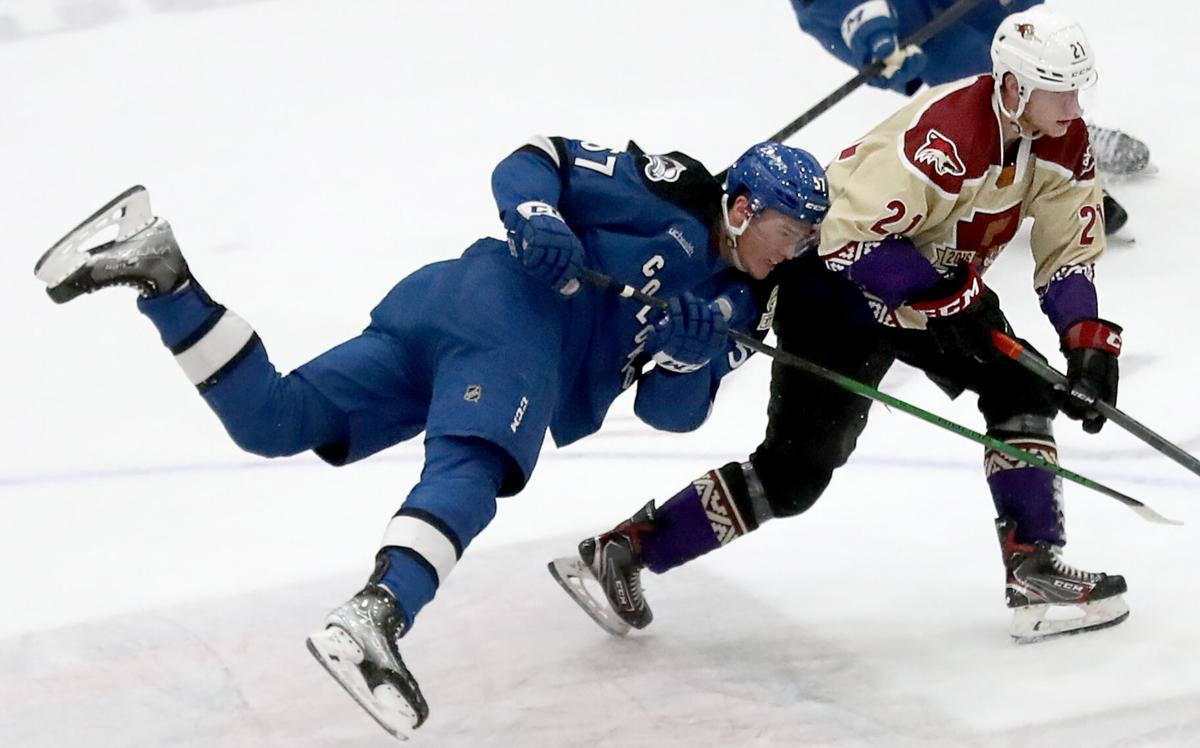No matter the story one particularly polarizing hockey statistic claims to say, forward Jan Jenik has been a plus for the Tucson Roadrunners this season, his coach and teammates contend.
Those positives earned Jenik, second on the Roadrunners with 16 goals and .85 points per game this season, yet another NHL call-up last week — despite his plus-minus rating of minus-27, a mark right near the bottom of the American Hockey League ranks. As it stands, Jenik ranks 1,242th out of 1,247 AHL players in plus-minus rating.
Mike Carcone, Jenik’s teammate with both the Roadrunners and Coyotes said he believes the stat does little to show the value Jenik has brought to Tucson.
“(Jenik) is a great example,” Carcone said prior to both players earning their most recent NHL recalls, of how “overrated” the plus-minus stat can be at times. “He’s a guy in our top six, a young centerman that goes up against the top players every night.
“Sometimes you eat those dashes, that’s what we like to call them. But that doesn’t mean he’s playing bad.”
The debate over the particular metric’s effectiveness stems from the logic that certain factors are out of players' control. The Roadrunners have the league’s worst goal differential this season. Tucson has scored a league-low 156 goals, while the Roadrunners’ 235 allowed is third-worst. That’s a minus-79 heading into Saturday’s 4 p.m. road tilt at the Rockford Ice Hogs.
Detractors of the plus-minus stat’s value would likely argue that Jenik, who logs major minutes across five-on-five, penalty kill and power play situations, clearly can’t be responsible for every goal given up while he’s on the ice.
“(Jenik is) another one of our young players that are playing in a lot of situations right now,” coach Jay Varady said just prior to the 21-year-old Czech Republic native’s most recent NHL recall. “He’s learning. He’s able to make a mistake, continue the play, continue to get shifts and learn.
It isn’t just plus-minus that stands out as a potentially misleading stat in Tucson this season. Roadrunners forward Boko Imama leads the AHL in penalty minutes. But there’s seems to be more than meets the eye there, too.
Of Imama’s 163 penalty minutes this season, more than a third have been directly attributed to the particular element of the game Imama is most well-known for: fights.
Due to a rule unique to the AHL, Imama actually earned an automatic one-game suspension last weekend when he picked up his 10th fight of the year. But that doesn’t mean the physicality — an unwillingness to be pushed around by opposing teams, and something that’s been missing at times on previous Roadrunners’ rosters — isn’t appreciated within the Roadrunners’ locker room.
“Energy” has been Varady’s word of choice on numerous occasions this season to describe the impact Imama, one of the Roadrunners alternate captains this season, has had in Tucson.
Imama’s prior career high in the category was 134 minutes in 50 games with the Ontario Reign two seasons ago. Cody McLeod, who was in Tucson with the Iowa Wild this past week — Iowa won both games by a combined score of 11-2 — is 30 penalty minutes behind Imama’s league-high number entering the final month of the regular season.
Another Roadrunner — or, in this case, an ex-Roadrunner — was in the hunt to lead the league in multiple scoring categories.
When forward Matias Maccelli played his last game with Tucson on Feb. 27, he was third in the AHL in points, while also leading all AHL rookies in points and assists. Almost six weeks after Maccelli was called up to the NHL’s Coyotes, his 41 assists still lead all rookies, and his 55 points only fell out of the top spot among first-year players a week ago. He’s also still in the top 20 in points league-wide.
Elsewhere, former Roadrunners and Coyotes defenseman Jordan Gross has all but run away with the AHL’s top mark for points by a defenseman. With roughly 10 games or so to go across the league, Gross’ 57 points in his first season with the Colorado Eagles are 10 better than the next closest AHL defenseman at this point. Gross was in Tucson for his first two full professional seasons, while spending most of last year with the Coyotes practice squad, earning seven appearances with the NHL club during the pandemic-adjusted 2020-21 campaign.





